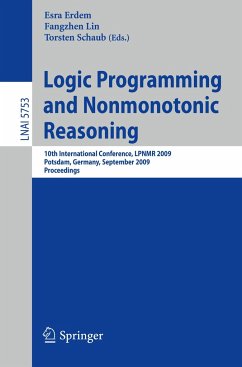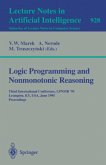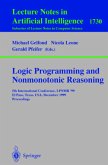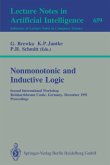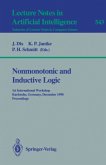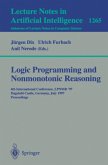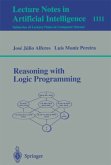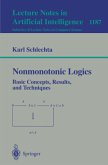Logic Programming and Nonmonotonic Reasoning
10th International Conference, LPNMR 2009, Potsdam, Germany, September 14-18, 2009, Proceedings
Herausgegeben:Erdem, Esra; Lin, Fangzhen; Schaub, Torsten
Logic Programming and Nonmonotonic Reasoning
10th International Conference, LPNMR 2009, Potsdam, Germany, September 14-18, 2009, Proceedings
Herausgegeben:Erdem, Esra; Lin, Fangzhen; Schaub, Torsten
- Broschiertes Buch
- Merkliste
- Auf die Merkliste
- Bewerten Bewerten
- Teilen
- Produkt teilen
- Produkterinnerung
- Produkterinnerung
This volume contains the proceedings of the 10th International Conference on Logic Programming and Nonmonotonic Reasoning (LPNMR 2009), held during September 14-18, 2009 in Potsdam, Germany. LPNMR is a forum for exchanging ideas on declarative logic programming, nonmonotonic reasoning and knowledge representation. The aim of the c- ference is to facilitate interaction between researchers interested in the design and implementation of logic-based programming languages and database s- tems, and researchers who work in the areas of knowledge representation and nonmonotonic reasoning. LPNMR…mehr
Andere Kunden interessierten sich auch für
![Logic Programming and Nonmonotonic Reasoning Logic Programming and Nonmonotonic Reasoning]() Logic Programming and Nonmonotonic Reasoning39,99 €
Logic Programming and Nonmonotonic Reasoning39,99 €![Logic Programming and Nonmonotonic Reasoning Logic Programming and Nonmonotonic Reasoning]() Michael Gelfond / Nicole Leone / Gerald Pfeifer (eds.)Logic Programming and Nonmonotonic Reasoning39,99 €
Michael Gelfond / Nicole Leone / Gerald Pfeifer (eds.)Logic Programming and Nonmonotonic Reasoning39,99 €![Nonmonotonic and Inductive Logic Nonmonotonic and Inductive Logic]() Gerhard Brewka / Klaus P. Jantke / Peter H. Schmitt (eds.)Nonmonotonic and Inductive Logic39,99 €
Gerhard Brewka / Klaus P. Jantke / Peter H. Schmitt (eds.)Nonmonotonic and Inductive Logic39,99 €![Nonmonotonic and Inductive Logic Nonmonotonic and Inductive Logic]() Jürgen Dix / Klaus P. Jantke / Peter H. Schmitt (eds.)Nonmonotonic and Inductive Logic39,99 €
Jürgen Dix / Klaus P. Jantke / Peter H. Schmitt (eds.)Nonmonotonic and Inductive Logic39,99 €![Logic Programming and Nonmonotonic Reasoning Logic Programming and Nonmonotonic Reasoning]() DixLogic Programming and Nonmonotonic Reasoning39,99 €
DixLogic Programming and Nonmonotonic Reasoning39,99 €![Reasoning with Logic Programming Reasoning with Logic Programming]() Jose J. AlferesReasoning with Logic Programming39,99 €
Jose J. AlferesReasoning with Logic Programming39,99 €![Nonmonotonic Logics Nonmonotonic Logics]() Karl SchlechtaNonmonotonic Logics39,99 €
Karl SchlechtaNonmonotonic Logics39,99 €-
-
-
This volume contains the proceedings of the 10th International Conference on Logic Programming and Nonmonotonic Reasoning (LPNMR 2009), held during September 14-18, 2009 in Potsdam, Germany. LPNMR is a forum for exchanging ideas on declarative logic programming, nonmonotonic reasoning and knowledge representation. The aim of the c- ference is to facilitate interaction between researchers interested in the design and implementation of logic-based programming languages and database s- tems, and researchers who work in the areas of knowledge representation and nonmonotonic reasoning. LPNMR strives to encompass theoretical and expe- mental studies that have led or will lead to the construction of practical systems for declarative programming and knowledge representation. The special theme of LPNMR 2009 was "Applications of Logic Progr- ming and Nonmonotonic Reasoning" in general and "Answer Set Programming (ASP)" in particular. LPNMR 2009 aimed at providing a comprehensive survey of the state of the art of ASP/LPNMR applications. The special theme was re?ected by dedicating an entire dayof the conference to applications. Apart from special sessions devoted to original and signi?cant ASP/LPNMR applications, we solicited contributions providing an overview of existing successful applications of ASP/LPNMR systems. The presentations on applications were accompanied by two panels, one on existing and another on future applications of ASP/LPNMR.
Produktdetails
- Produktdetails
- Lecture Notes in Computer Science 5753
- Verlag: Springer / Springer Berlin Heidelberg / Springer, Berlin
- Artikelnr. des Verlages: 12752607, 978-3-642-04237-9
- 2009
- Seitenzahl: 676
- Erscheinungstermin: 7. September 2009
- Englisch
- Abmessung: 235mm x 155mm x 37mm
- Gewicht: 1008g
- ISBN-13: 9783642042379
- ISBN-10: 3642042376
- Artikelnr.: 26873802
- Herstellerkennzeichnung
- Springer-Verlag GmbH
- Tiergartenstr. 17
- 69121 Heidelberg
- ProductSafety@springernature.com
- Lecture Notes in Computer Science 5753
- Verlag: Springer / Springer Berlin Heidelberg / Springer, Berlin
- Artikelnr. des Verlages: 12752607, 978-3-642-04237-9
- 2009
- Seitenzahl: 676
- Erscheinungstermin: 7. September 2009
- Englisch
- Abmessung: 235mm x 155mm x 37mm
- Gewicht: 1008g
- ISBN-13: 9783642042379
- ISBN-10: 3642042376
- Artikelnr.: 26873802
- Herstellerkennzeichnung
- Springer-Verlag GmbH
- Tiergartenstr. 17
- 69121 Heidelberg
- ProductSafety@springernature.com
Session 1. Invited Talks.- SAT, SMT and Applications.- Logic-Based Modeling in Systems Biology.- Integrating Answer Set Programming and Satisfiability Modulo Theories.- Session 2. Technical Papers.- How Flexible Is Answer Set Programming? An Experiment in Formalizing Commonsense in ASP.- Splitting a CR-Prolog Program.- Contextual Argumentation in Ambient Intelligence.- Argumentation Context Systems: A Framework for Abstract Group Argumentation.- A Revised Concept of Safety for General Answer Set Programs.- Magic Sets for the Bottom-Up Evaluation of Finitely Recursive Programs.- Relevance-Driven Evaluation of Modular Nonmonotonic Logic Programs.- Complexity of the Stable Model Semantics for Queries on Incomplete Databases.- Manifold Answer-Set Programs for Meta-reasoning.- A Deductive System for FO(ID) Based on Least Fixpoint Logic.- Computing Stable Models via Reductions to Difference Logic.- A Module-Based Framework for Multi-language Constraint Modeling.- Induction on Failure: Learning Connected Horn Theories.- On Reductive Semantics of Aggregates in Answer Set Programming.- A First Order Forward Chaining Approach for Answer Set Computing.- Knowledge Qualification through Argumentation.- Simple Random Logic Programs.- Max-ASP: Maximum Satisfiability of Answer Set Programs.- Belief Revision with Bounded Treewidth.- Casting Away Disjunction and Negation under a Generalisation of Strong Equivalence with Projection.- A Default Approach to Semantics of Logic Programs with Constraint Atoms.- The Complexity of Circumscriptive Inference in Post's Lattice.- Trichotomy Results on the Complexity of Reasoning with Disjunctive Logic Programs.- Belief Logic Programming: Uncertainty Reasoning with Correlation of Evidence.- Weight Constraint Programs with Functions.- Session 3.Original Application Papers.- Bridging the Gap between High-Level Reasoning and Low-Level Control.- A General Approach to the Verification of Cryptographic Protocols Using Answer Set Programming.- An ASP-Based System for e-Tourism.- cc? on Stage: Generalised Uniform Equivalence Testing for Verifying Student Assignment Solutions.- Session 4. Short Papers.- Translating Preferred Answer Set Programs to Propositional Logic.- CR-Prolog as a Specification Language for Constraint Satisfaction Problems.- Modeling Multi-agent Domains in an Action Languages: An Empirical Study Using .- Computing Weighted Solutions in Answer Set Programming.- Representing Multi-agent Planning in CLP.- Prototypical Reasoning with Low Complexity Description Logics: Preliminary Results.- AQL: A Query Language for Action Domains Modelled Using Answer Set Programming.- Level Mapping Induced Loop Formulas for Weight Constraint and Aggregate Programs.- Layer Supported Models of Logic Programs.- Applying ASP to UML Model Validation.- The Logical Consequence Role in LPNMR: A Parameterized Computation Approach.- Social Default Theories.- Session 5. System Descriptions.- nfn2dlp and nfnsolve: Normal Form Nested Programs Compiler and Solver.- An ASP System with Functions, Lists, and Sets.- A Simple Distributed Conflict-Driven Answer Set Solver.- An Implementation of Belief Change Operations Based on Probabilistic Conditional Logic.- On the Input Language of ASP Grounder Gringo.- The Conflict-Driven Answer Set Solver clasp: Progress Report.- System f2lp - Computing Answer Sets of First-Order Formulas.- The First Version of a New ASP Solver : ASPeRiX.- An ASP-Based Data Integration System.- Gorgias-C: Extending Argumentation with Constraint Solving.- Session 6. Summaries of Existing SuccessfulApplications Papers.- ANTON: Composing Logic and Logic Composing.- Modelling Normative Frameworks Using Answer Set Programing.- Generating Optimal Code Using Answer Set Programming.- Logic Programming Techniques in Protein Structure Determination: Methodologies and Results.- PHYLO-ASP: Phylogenetic Systematics with Answer Set Programming.- HAPLO-ASP: Haplotype Inference Using Answer Set Programming.- Using Answer Set Programming to Enhance Operating System Discovery.- Non-monotonic Reasoning Supporting Wireless Sensor Networks for Intelligent Monitoring: The SINDI System.- Session 7. Short Application Papers.- Some DLV Applications for Knowledge Management.- Application of ASP for Automatic Synthesis of Flexible Multiprocessor Systems from Parallel Programs.- Optimal Multicore Scheduling: An Application of ASP Techniques.- Session 8 (Panel on Future Applications). Position Papers by the Panelists.- From Data Integration towards Knowledge Mediation.- Integrating Answer Set Modules into Agent Programs.- What Next for ASP? (A Not-Entirely-Well-Informed Opinion).- Using Lightweight Inference to Solve Lightweight Problems.- Present and Future Challenges for ASP Systems.- ASP: The Future Is Bright.- Exploiting ASP in Real-World Applications: Main Strengths and Challenges.- Making Your Hands Dirty Inspires Your Brain! Or How to Switch ASP into Production Mode.- Towards an Embedded Approach to Declarative Problem Solving in ASP.- System Competition. Summary of System Competition.- The Second Answer Set Programming Competition.
Session 1. Invited Talks.- SAT, SMT and Applications.- Logic-Based Modeling in Systems Biology.- Integrating Answer Set Programming and Satisfiability Modulo Theories.- Session 2. Technical Papers.- How Flexible Is Answer Set Programming? An Experiment in Formalizing Commonsense in ASP.- Splitting a CR-Prolog Program.- Contextual Argumentation in Ambient Intelligence.- Argumentation Context Systems: A Framework for Abstract Group Argumentation.- A Revised Concept of Safety for General Answer Set Programs.- Magic Sets for the Bottom-Up Evaluation of Finitely Recursive Programs.- Relevance-Driven Evaluation of Modular Nonmonotonic Logic Programs.- Complexity of the Stable Model Semantics for Queries on Incomplete Databases.- Manifold Answer-Set Programs for Meta-reasoning.- A Deductive System for FO(ID) Based on Least Fixpoint Logic.- Computing Stable Models via Reductions to Difference Logic.- A Module-Based Framework for Multi-language Constraint Modeling.- Induction on Failure: Learning Connected Horn Theories.- On Reductive Semantics of Aggregates in Answer Set Programming.- A First Order Forward Chaining Approach for Answer Set Computing.- Knowledge Qualification through Argumentation.- Simple Random Logic Programs.- Max-ASP: Maximum Satisfiability of Answer Set Programs.- Belief Revision with Bounded Treewidth.- Casting Away Disjunction and Negation under a Generalisation of Strong Equivalence with Projection.- A Default Approach to Semantics of Logic Programs with Constraint Atoms.- The Complexity of Circumscriptive Inference in Post's Lattice.- Trichotomy Results on the Complexity of Reasoning with Disjunctive Logic Programs.- Belief Logic Programming: Uncertainty Reasoning with Correlation of Evidence.- Weight Constraint Programs with Functions.- Session 3.Original Application Papers.- Bridging the Gap between High-Level Reasoning and Low-Level Control.- A General Approach to the Verification of Cryptographic Protocols Using Answer Set Programming.- An ASP-Based System for e-Tourism.- cc? on Stage: Generalised Uniform Equivalence Testing for Verifying Student Assignment Solutions.- Session 4. Short Papers.- Translating Preferred Answer Set Programs to Propositional Logic.- CR-Prolog as a Specification Language for Constraint Satisfaction Problems.- Modeling Multi-agent Domains in an Action Languages: An Empirical Study Using .- Computing Weighted Solutions in Answer Set Programming.- Representing Multi-agent Planning in CLP.- Prototypical Reasoning with Low Complexity Description Logics: Preliminary Results.- AQL: A Query Language for Action Domains Modelled Using Answer Set Programming.- Level Mapping Induced Loop Formulas for Weight Constraint and Aggregate Programs.- Layer Supported Models of Logic Programs.- Applying ASP to UML Model Validation.- The Logical Consequence Role in LPNMR: A Parameterized Computation Approach.- Social Default Theories.- Session 5. System Descriptions.- nfn2dlp and nfnsolve: Normal Form Nested Programs Compiler and Solver.- An ASP System with Functions, Lists, and Sets.- A Simple Distributed Conflict-Driven Answer Set Solver.- An Implementation of Belief Change Operations Based on Probabilistic Conditional Logic.- On the Input Language of ASP Grounder Gringo.- The Conflict-Driven Answer Set Solver clasp: Progress Report.- System f2lp - Computing Answer Sets of First-Order Formulas.- The First Version of a New ASP Solver : ASPeRiX.- An ASP-Based Data Integration System.- Gorgias-C: Extending Argumentation with Constraint Solving.- Session 6. Summaries of Existing SuccessfulApplications Papers.- ANTON: Composing Logic and Logic Composing.- Modelling Normative Frameworks Using Answer Set Programing.- Generating Optimal Code Using Answer Set Programming.- Logic Programming Techniques in Protein Structure Determination: Methodologies and Results.- PHYLO-ASP: Phylogenetic Systematics with Answer Set Programming.- HAPLO-ASP: Haplotype Inference Using Answer Set Programming.- Using Answer Set Programming to Enhance Operating System Discovery.- Non-monotonic Reasoning Supporting Wireless Sensor Networks for Intelligent Monitoring: The SINDI System.- Session 7. Short Application Papers.- Some DLV Applications for Knowledge Management.- Application of ASP for Automatic Synthesis of Flexible Multiprocessor Systems from Parallel Programs.- Optimal Multicore Scheduling: An Application of ASP Techniques.- Session 8 (Panel on Future Applications). Position Papers by the Panelists.- From Data Integration towards Knowledge Mediation.- Integrating Answer Set Modules into Agent Programs.- What Next for ASP? (A Not-Entirely-Well-Informed Opinion).- Using Lightweight Inference to Solve Lightweight Problems.- Present and Future Challenges for ASP Systems.- ASP: The Future Is Bright.- Exploiting ASP in Real-World Applications: Main Strengths and Challenges.- Making Your Hands Dirty Inspires Your Brain! Or How to Switch ASP into Production Mode.- Towards an Embedded Approach to Declarative Problem Solving in ASP.- System Competition. Summary of System Competition.- The Second Answer Set Programming Competition.

